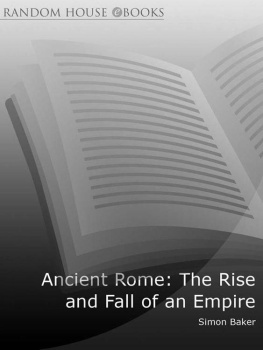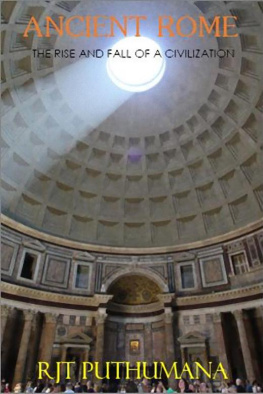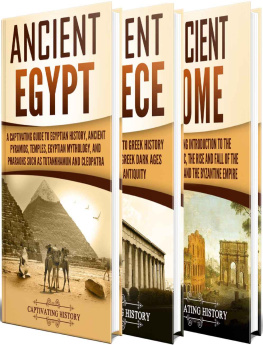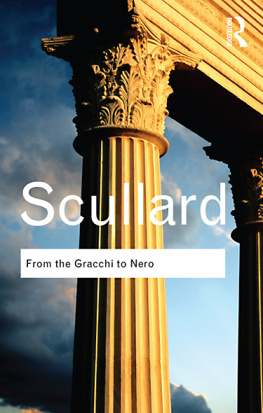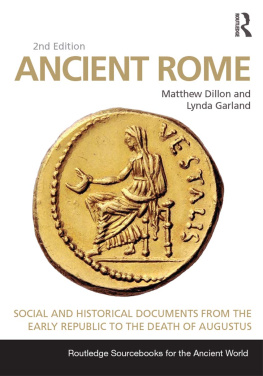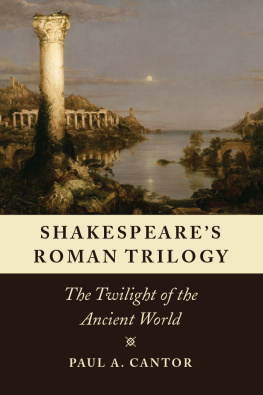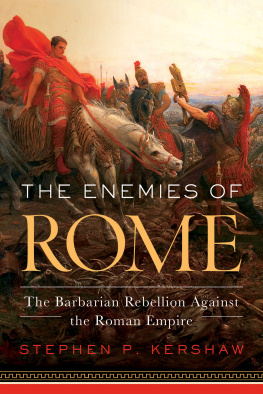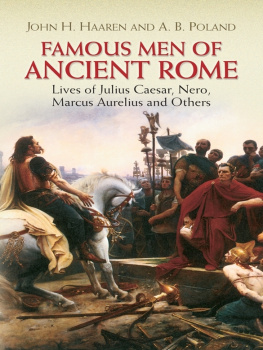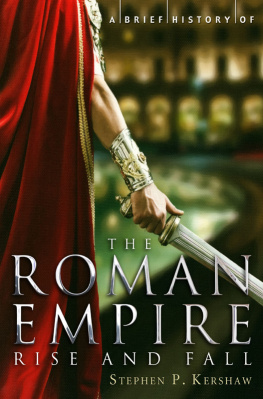A NCIENT R OME
| THE RISE AND FALL |
| OF AN EMPIRE |
Simon Baker

This eBook is copyright material and must not be copied, reproduced, transferred, distributed, leased, licensed or publicly performed or used in any way except as specifically permitted in writing by the publishers, as allowed under the terms and conditions under which it was purchased or as strictly permitted by applicable copyright law. Any unauthorised distribution or use of this text may be a direct infringement of the authors and publishers rights and those responsible may be liable in law accordingly.
Version 1.0
Epub ISBN 9781409073888
www.randomhouse.co.uk
10 9 8 7 6 5 4 3 2 1
First published in 2006
This edition published in 2007 by BBC Books, an imprint of Ebury Publishing.
A Random House Group Company.
Copyright Simon Baker 2006
Foreword by Mary Beard Woodlands Books Ltd 2006
Simon Baker has asserted his right to be identified as the author of this Work in accordance with the Copyright, Designs and Patents Act 1988.
All rights reserved. No part of this publication may be reproduced, stored in a retrieval system, or transmitted in any form or by any means, electronic, mechanical, photocopying, recording or otherwise, without the prior permission of the copyright owner.
The Random House Group Limited Reg. No. 954009
Addresses for companies within the Random House Group can be found at
www.randomhouse.co.uk
A CIP catalogue record for this book is available from the British Library.
ISBN 978 1 846 07284 0
The Random House Group Limited makes every effort to ensure that the papers used in our books are made from trees that have been legally sourced from well-managed and credibly certified forests. Our paper procurement policy can be found on www.randomhouse.co.uk
To buy books by your favourite authors and register for offers visit
www.rbooks.co.uk
Commissioning editor: Martin Redfern
Project editor: Eleanor Maxfield
Copy editor: Trish Burgess
Designer: seagulls.net
Maps and family trees by HL Studios, Long Hanborough, Oxon
Picture researcher: Sarah Hopper
Production controller: David Brimble
Printed and bound in the UK by CPI Cox & Wyman, Reading, RG1 8EX
C ONTENTS
For my mother, Patsy
Your task, Roman, and do not forget it, will be to govern the peoples of the world in your empire. These will be your arts and to impose a settled pattern upon peace, to pardon the defeated and war down the proud.
Vergil, Aeneid
So power and greed ran riot, contaminated and pillaged everything, and held nothing sacred or worthy of respect until [the Romans] plunged themselves to their own destruction.
Sallust, War with Jugurtha
F OREWORD
Rome was a city founded on murder. In 753 BC the twin brothers Romulus and Remus at the head of a small band of exiles and malcontents dug the defences of the tiny village that was to become the capital of an empire that stretched from Scotland to the Sahara and beyond. But excitement soon turned to tragedy. The brothers quarrelled, and Romulus killed his twin.
More problems were soon to follow. Romulus had only a handful of supporters. So where were the citizens for the new city to be found? The answer was: from all-comers. Romulus declared his city an asylum, and welcomed any exiles, refugees, runaway slaves and criminals who chose to take up residence. Rome was a city populated entirely by, in the ancient sense of the term (which is not so very far from our own), asylum-seekers.
That took care of the men. But where were the women to be found to make the wives and mothers in his new state? Here Romulus resorted to mean trickery. He invited some of the neighbouring peoples to a religious festival and, when he gave the signal, had his lads run off with the young female guests. This so-called Rape of the Sabine Women has appealed to writers and artists ever since as a story of violence, lust and hard-headed political expediency.
We have no idea how much of this lurid tale is actually true. The precise date of 753 is the result of an elaborate and frankly unreliable calculation more than five hundred years later by Roman scholars, who were as interested as their modern equivalents in working out when exactly Rome began; but it does fit roughly with evidence that has been recovered by archaeologists for the earliest phases of the city. Romulus himself was no more or less an historical person than King Arthur of Britain.
But, accurate or not, this is how the Romans for the rest of their history, over more than a millennium, told the story of Romes origins. They saw in the story many of the questions that were to dominate their political life ever after, and for that matter still dominate ours. These are the exciting themes that underlie this book. How should a state be governed? Can violence ever be justified in politics? Who has a right to citizenship and to benefit from its privileges?
When Romans reflected on the civil wars that sometimes scarred their political life, they looked back to the quarrel of Romulus and Remus and saw their city as destined from the very beginning to suffer the nastiest kind of internecine strife. The death of Romulus also provided them with food for thought. They could not agree whether he had in the end been taken up to heaven by the grateful gods, or hacked to death by angry citizens. This was a story debated with even greater intensity after the murder of Julius Caesar (see ) in 44 BC hacked to death by his enemies in the name of liberty for becoming an autocrat, yet made into a god by his supporters and honoured with his own temple in the heart of the city.
This book concentrates on six pivotal moments in the history of Rome, from the second century BC to the fifth century AD a time of dramatic, sometimes revolutionary, change. During this period, Rome came to be the dominating power around the Mediterranean and much further afield (traces of the presence of Roman traders have been found as far east as India). It turned from a more or less democratic republic into an autocratic empire. And most dramatic of all perhaps Rome was finally ) was the first Roman emperor publicly to sponsor Christianity. Indeed, he was the original founder of several of the churches and cathedrals that define the sacred landscape of Rome even today, including the first St Peters.
Each of the pivotal moments touches on big questions of political change and conflict. The story of Tiberius Gracchus (see ) explores the consequences of autocracy gone mad. But these particular moments have been chosen for another reason too. For they offer us a vivid glimpse of some of the key personalities in Roman history. They let us get close to individual characters, their human motives, their political dilemmas, and their attempts to change the world in which they lived.
Modern professional historians tend to stress how little we know about the Roman world. True, we are almost completely in the dark about what life was like for the slum dwellers of the city (though we can make a fair guess!) or for peasants struggling to find a livelihood in the countryside. And we are not much better off when it comes to understanding the feelings of women or slaves, or how the Roman empires balance of payments actually worked, or for that matter what Romans wore under their togas or how they disposed of their sewage (the miracles of Roman drainage have, I am afraid, been grossly exaggerated). But on a wide range of other aspects we are probably better informed about Rome than about any other society before the fifteenth century. We have direct access to the writings, the thoughts and feelings of Roman politicians, poets, philosophers, critics and commentators.

